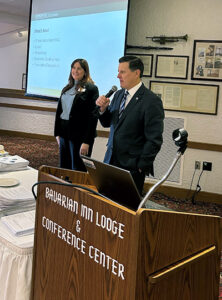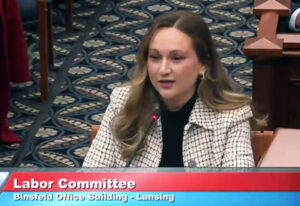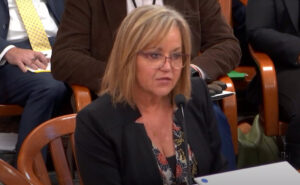MAC joins local groups in urging action on revenue sharing

Antoinette Wallace makes the county case for revenue sharing reform during a Lansing press conference on Dec. 3, 2024.
“So, clearly, the system is broken.”
MAC First Vice President Antoinette Wallace of Macomb made that assessment of Michigan’s revenue sharing system Tuesday at a Lansing event touting immediate passage of bills to create a dedicated Revenue Sharing Trust Fund.
“I believe that a dedicated revenue sharing fund, separate from annual budget politics in Lansing, is essential to meeting the promises made decades ago by our state,” said Antoinette Wallace of Macomb County, MAC’s first vice president. “It’s not like we, from a local level, have not had reasons to question the state’s commitment. Twenty-five years ago, the state allocated $228 million to counties via revenue sharing. Had the state simply adjusted that figure for inflation each year, counties would have received nearly $404 million this year,” she told media members at the event, which featured elected officials from counties, cities and townships. (Click here to see a video of Wallace’s remarks.)
The Dec. 3 rally highlighted the results of a letter campaign that yielded hundreds of messages for Gov. Gretchen Whitmer from local leaders, urging her to throw her weight behind House Bills 4274-75, now awaiting action in the Senate.
UPDATED: MAC received nearly 180 letters of support from officials in 36 counties: Allegan, Alpena, Baraga, Barry, Benzie, Branch, Calhoun, Cass, Cheboygan, Chippewa, Clare, Clinton, Crawford, Dickinson, Eaton, Gogebic, Ionia, Iosco, Iron, Isabella, Kalamazoo, Lenawee, Livingston, Mackinac, Mecosta, Montcalm, Montmorency, Muskegon, Newaygo, Oakland, Ontonagon, Osceola, Saginaw, Van Buren, Wayne and Wexford.
“We appreciate the quick and broad response from our members on this,” said MAC Governmental Affairs Director Deena Bosworth. “The governor is the key to getting our reforms unstuck in the Senate and into law before the Legislature exits later this month.”
For details on the legislation, see MAC’s Issue Brief. For questions, contact Deena Bosworth at bosworth@micounties.org.
MAC makes case against haste on septic code legislation

“MAC believes this legislation should be given more consideration before advancing,” MAC’s Madeline Fata told a Senate committee on Dec. 3 about bills to create a statewide septic code.
MAC joined other groups this week in testifying against legislation for a statewide septic code now before a Senate committee.
More than a dozen stakeholders, ranging from public health leaders to Realtors, presented before the Senate Natural Resources Committee on Senate Bills 299-300, by Sen. Sam Singh (D-Ingham).
In her testimony, MAC Governmental Affairs Associate Madeline Fata said, “This legislation preempts local control by mandating the repeal of all local point of sale ordinances. Our organization believes, and our counties have proven, that point-of-sale works.
“For example, Benzie County’s point-of-sale program began in 1992,” she continued, “and at that time about 17 percent of tanks inspected were considered nonconforming. Now, only about 3 percent of tanks in the county are nonconforming, as they have been able to identify many of these failing systems over time.”
Fata and others emphasized the need for more time to make additional changes and clarifications to the legislation. Most agreed that this should not be rushed through in the final weeks of the legislative session.
Fata also voiced concern over the lack of funding for health departments to administer the program, and for homeowners to comply: “The District 10 Health Department oversees 10 counties, and they have estimated that they have over 160,000 septic tanks in their jurisdiction. Excluding Saturdays, Sundays and major holidays, assuming they can access the tanks through frozen ground in winter, that is an average of 61.5 evaluations per day. The number of evaluators District 10 would need to recruit, hire and pay to achieve this goal is difficult to calculate but undeniably costly. This could easily become an unfunded mandate.”
See Fata’s full testimony here, starting at the 1:06:41 mark.
It’s not clear if the bills will advance out of committee next week.
For more information on this issue, contact Madeline Fata at fata@micounties.org.

Executive Director Stephan Currie introduces MAC Board President Melissa Daub at the Dec. 2 New Commissioner School in Frankenmuth.
Commissioners gather in Frankenmuth, Shelbyville for training
Nearly 90 newly elected or re-elected county commissioners assembled in two locations this week as part of the 2024 New Commissioner School (NCS), a training program co-sponsored by MAC and MSU Extension.
In Frankenmuth, participants were greeted by MAC Board President Melissa Daub of Wayne, who noted she began her own training as a county commissioner in the same spot in 2018.
An always popular segment of the training is a briefing on Michigan’s Open Meetings Act (OMA) conducted by the firm of Cohl, Stoker and Toskey, P.C. To facilitate that session, MAC and the firm print and distribute an OMA summary booklet to attendees. (After NCS, MAC will have a limited supply of booklets available. If your county is interested in an amount of 20 copies or fewer, contact Communications Director Derek Melot at melot@micounties.org.)
Finally, MAC also has posted a digital version of the booklet to our website.
The last two sites for NCS will be Dec. 9 in Grayling and Dec. 10 in Escanaba. Overall, MAC and MSUE expect more than 150 commissioners to go through at least some portion of the training.
Minimum staffing bill passes Senate Labor Committee

MAC’s Samantha Gibson testifies against minimum staffing legislation before the Senate Labor Committee on Dec. 5, 2024.
A bill to require minimum staffing levels as a mandatory subject of collective bargaining between a public employer and the representative of its employees was passed out of the Senate Labor Committee this week, after the House version was successfully removed from the House floor agenda in November due to MAC’s efforts.
Senate Bill 1167, by Sen. Veronica Klinefelt (D-Macomb), an identical bill to House Bill 4688, by Rep. Jim Haadsma (D-Calhoun), would amend the Public Employment Relations Act (PERA) and specifies that “other terms and conditions of employment” would include minimum staffing levels within the bargaining unit and consider minimum staffing levels a condition of employment with respect to a bargaining representative’s collective bargaining responsibilities. SB 1167 and HB 4688 would limit its application to only Public Act 312 employees, which was recently expanded to include corrections officers.
Making minimum staffing levels a mandatory topic of collective bargaining could increase staffing costs to counties. In addition to the potential for increased costs, many counties are facing staffing shortages. Implementing minimum staffing requirements when local governments are struggling to maintain fully staffed facilities will add to the difficulties counties already face when recruiting and retaining employees.
MAC opposes this legislation, as do the Michigan Municipal League and Michigan Townships Association. A letter of opposition was shared with Senate Labor Committee members this week and was sent to all House members in November.
MAC strongly encourages members to contact their legislators and inform them of the detrimental effects of this bill.
For more information on this issue, contact Samantha Gibson at gibson@micounties.org.
Damaging health insurance bill advances to House floor

“This approach is overly complicated and opens the door for more contentious and more costly bargaining with our employees, many of whom have the benefit of binding arbitration,” MAC’s Deena Bosworth told a House committee considering a bill to alter employer contribution rules for health insurance plans.
A flawed attempt to reform state law on employer contributions to health insurance programs was rushed out of a House committee this week, despite opposition from MAC and others.
House Bill 6058, by Rep. Mai Xiong (D-Macomb), would amend the Publicly Funded Health Insurance Contribution Act, commonly known as PA 152 of 2011. The bill would increase the employer contribution to employee health insurance and significantly increase the number of items and groups that can bargain for additional contributions.
PA 152 was enacted to curb rising health care costs, while fostering shared responsibility between employees and employers. It offered counties three cost-sharing options:
- Hard cap: employers contribute up to a legislatively established maximum
- 80/20 model: Employers pay no more than 80 percent of health plan costs, with employees covering the remaining 20 percent
- Opt-out: Counties negotiate health contributions directly with bargaining units, often leading to disparities between employee groups
Most counties have adhered to the hard cap or 80/20 models to avoid costly and contentious negotiations. However, the act’s original inflationary mechanism, tied to the U.S. Consumer Price Index’s medical care component, failed to reflect the true rise in health care costs, especially in areas like prescription drugs. As a result, employees have been burdened with an increasing share of premiums.
HB 6058 introduces changes to address these shortcomings but does so in a way that complicates an already delicate balance between those employee groups represented by a bargaining unit, those groups who enjoy binding arbitration and those groups that do not belong to a bargaining unit.
MAC, instead, advocates for a straightforward and effective fix to PA 152 that respects its original goals:
- Hard cap reset: Adjust the hard cap to higher levels reflective of today’s health care costs, easing the financial burden on employees.
- Inflationary adjustments: Replace the current inflationary measure with one based on the average health care rate increases approved annually by the Michigan Department of Insurance and Financial Services. This mechanism would reflect Michigan’s health care realities and ensure the cap keeps pace with rising costs.
This approach would allow employers to contribute more toward health care premiums, alleviating financial strain on employees and maintaining the original law’s intent to control costs and promote fiscal responsibility.
While the committee did not act on MAC’s advice, MAC stands ready to collaborate on solutions that address these issues without undermining counties’ ability to serve residents effectively.
MAC opposes the current version of HB 6058, now on the House floor, to protect counties from the pitfalls of prolonged and contentious labor negotiations and exposure to significantly more of the financial burden of the benefits.
For more information on this issue, contact Deena Bosworth at bosworth@micounties.org.
Prisoner productivity credit bills advance in Senate
 Legislation to allow certain prisoners to earn productivity credits to reduce their sentence was passed out of the Senate Committee on Civil Rights, Judiciary and Public Safety this week.
Legislation to allow certain prisoners to earn productivity credits to reduce their sentence was passed out of the Senate Committee on Civil Rights, Judiciary and Public Safety this week.
Senate Bills 861–864 would only apply to future sentences in allowing prisoners to receive productivity credits. Under the legislation, prosecutors are required to notify victims at the time of sentencing that an earlier release date is possible, if the offender completes productivity credits.
While completing productivity credits would deem a prisoner eligible for early release, the parole board will still make final decisions regarding release dates, with final discretion remaining with judges and prosecutors.
SBs 861-864 would remove truth-in-sentencing, leaving many victims of crime with uncertainty regarding the minimum sentence their offender would serve.
MAC opposes the bills, as do the Prosecuting Attorneys Association of Michigan and the Michigan Sheriffs’ Association.
For more information on this issue, contact Samantha Gibson at gibson@micounties.org.
Treasury issues reminder about ARP spending deadline
 All ARPA funds provided to local governments in Michigan through the Coronavirus State and Local Fiscal Recovery Funds (SLFRF) program must be obligated by Dec. 31, 2024. Any funds not obligated by this date will be subject to recapture, resulting in a loss of critical resources for your community.
All ARPA funds provided to local governments in Michigan through the Coronavirus State and Local Fiscal Recovery Funds (SLFRF) program must be obligated by Dec. 31, 2024. Any funds not obligated by this date will be subject to recapture, resulting in a loss of critical resources for your community.
See more on this by clicking here.
Note that if you received SLFRF funds, you should have been sent two email notices from the U.S. Treasury. The first was sent on or about Nov. 14 and the second was sent on or about Nov. 20. These two notices give you detailed information regarding their requirements. It is suggested that you review them as soon as possible.
See also: Countdown to ARPA’s SLFRF obligation deadline: Top 5 insights for local governments
 Staff picks
Staff picks
- Michigan’s 2024 firearm deer season sees 2.7% drop in harvest (Huron Daily Tribune)
- NACo Legal Advocacy: McLaughlin Chiropractic Associates, Inc. v. McKesson Corporation (NACo County News)
- California utilities produce more solar energy than the state can use (Governing)
- For 60 years, an eerie quack sounded across the seas. Scientists just found its source. (Popular Mechanics)
